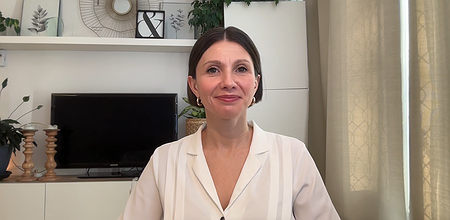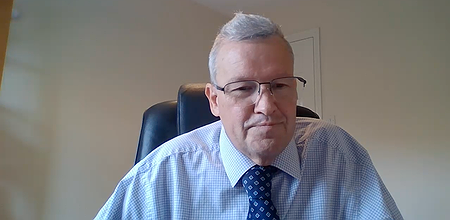A theoretical course illustrated with clinical examples. This course is composed of videos of 5 to 15 minutes each. The PowerPoint of the course to download.
Recognize and Treat Burnout
Dr. Valentina Munoz, Psychologist
Robust framework and actionable guide for developing personalized treatment plans
Excerpt:
- 4h of continuing education
- 26 lessons that last from 5 to 15 minutes each
- 1 certificate of achievement
- 1 PowerPoint
- 1 bibliography
- 1 course evaluation
- 4 months access - automatically extended until you complete the course
- 7-day money back guarantee
- 97% of participants who completed the satisfaction survey declare they would recommend this course to a colleague
Overview
Burnout is an increasingly prevalent and multifaceted challenge impacting individuals across all professional sectors—from frontline staff to top executives. Clinicians are reporting higher numbers of patients experiencing significant exhaustion, disconnection, and reduced effectiveness at work, yet these patients often do not meet diagnostic criteria for mood or anxiety disorders. This ambiguity complicates case formulation, diagnosis, and effective treatment planning.
This workshop bridges that critical gap by providing you with a clear, structured methodology for assessing and effectively treating burnout. Based on contemporary research and theoretical models, the training delivers practical tools to distinguish burnout from overlapping conditions, identify specific contributing factors—including organizational, cognitive, and emotional influences—and customize interventions suited to each patient's unique profile. Particular emphasis is placed on treatment planning strategies such as appropriate pacing, meaningful goal-setting, and empowering patients to regain purpose, vitality, and a sense of agency in their professional lives.
Participants will gain a robust framework for conceptualizing burnout, a detailed, actionable guide for developing personalized treatment plans, and collaborative strategies for engaging with patients who feel immobilized, hopeless, or resigned. The insights and tools offered in this training apply broadly across various professional contexts and client backgrounds, making it an essential resource in every clinician’s professional toolkit.
About the expert
![Picture of Valentina Munoz [en]](/media/studeo/teachers/2025/Valentina-Munoz-7500-HR_bust_oBugb3I.jpg.500x500_q85_box-0%2C190%2C3337%2C3523_crop_detail.jpg)
Dr. Valentina Munoz, psychologist, is a clinical psychologist specializing in cognitive-behavioral therapy (CBT) for treating anxiety and stress-related issues in adults. She earned her PhD in clinical and research psychology from Université de Montréal, Canada, in 2005.
With extensive experience in private practice, Dr. Munoz provides psychotherapy and offers workshops for both the general public and mental health professionals. Her work focuses on anxiety disorders, burnout prevention, resilience, and stress management.
Dr. Munoz spent 10 years at the Douglas Mental Health University Institute, where she treated individuals with severe anxiety disorders and complex co-occurring issues, while also supervising PhD psychology interns. She has also served for many years as an external resource for the Canadian Armed Forces, supporting veterans coping with PTSD.
Valentina Munoz is a licensed member of the Ordre des Psychologues du Québec and is fluent in French, English, and Spanish.
Learning objectives
- Identify key signs and symptoms of burnout across different professions and differentiate burnout from related conditions
- Assess burnout using standardized tools and conduct thorough clinical interviews to guide diagnosis and treatment planning
- Develop a comprehensive treatment plan tailored to the unique experiences of clients with burnout
- Apply effective intervention strategies to help clients restore energy, motivation, and meaning in their work lives
Learning material
Syllabus
- PowerPoint
- 1. Introduction
-
Introduction to Burnout
- 2. Recognizing and Understanding Burnout
- 3. Stages of Burnout Development
- 4. How Does Burnout Develop
- 5. Contributing Factors
- 6. Assessing Burnout with Standardized Tools
- 7. Assessing Burnout with Semi-Structured Clinical Interviews
- 8. Clinical Case- Daniel, the Overwhelmed Executive
-
Interventions
- 9. Lifestyle and Recovery-Based Interventions- Self-Care
- 10. Lifestyle and Recovery-Based Interventions- Setting Boundaries
- 11. Lifestyle and Recovery-Based Interventions- Taking Time Off Work
- 12. Cognitive Behavioral Therapy (CBT) Cognitive Restructuring
- 13. Cognitive Restructuring Scenario
- 14. Cognitive Behavioral Therapy Cognitive Restructuring
- 15. Understanding Mindfulness-Based Interventions
- 16. Mindfulness-Based Interventions- Body Scan
- 17. Mindfulness-Based Interventions- 3-minute Breathing Space
- 18. Self-Compassion Interventions
- 19. Acceptance and Commitment Therapy
- 20. Organizational Interventions- Matching the Mismatches part 1
- 21. Organizational Interventions- Matching the Mismatches part 2
- 22. Organizational Interventions- Communication Skills
- 23. Organizational Interventions- Time Management
- 24. Clinical Case- 10 Sessions Example
- 25. Protective Factors and Strengths
- 26. Conclusion
- Copenhagen Burnout Inventory
- The Job Demands-Resources Questionnaire
- Oldenburg Burnout Inventory
- 3 minutes breathing
- Body Scan Script
- Self-Compassion script and clinician guidelines
- Bibliography
CE Credits
Download a certificate of successful completion.
Audience
This course is intended for mental health professionals.
Registration
Ask a question
Do you have a question? Then email us at contact@asadis.net
Frequently asked questions
-
How long do I have access to the course?
After your registration, the course is accessible anytime and from anywhere for 124 days.
-
When does the course start?
That is entirely up to you! When you buy a course, you'll receive an access link that you can activate when you want.
-
Is there a student rate?
Yes there is! To learn more, email us at contact@asadis.net.
You may also be interested in:
Legal notice
The courses offered by ASADIS are accredited by different professional organisations. In addition, ASADIS is approved by the Canadian Psychological Association to offer continuing education for psychologists. ASADIS maintains responsibility for the program.
The CPA’s approval of an individual, group, or organization as a CE Sponsor or Provider is restricted to the activities described in the approved application or annual report form. The CPA’s approval does not extend to any other CE activity the Sponsor or Provider might offer. In granting its approval, the CPA assumes no legal or financial obligations to Sponsors, Providers, or to those individuals who might participate in a Sponsor or Provider’s CE activities or programs. Further, responsibility for the content, provision, and delivery of any CE activity approved by the CPA remains that of the CE Sponsor or Provider. The CPA disclaims all legal liability associated with the content, provision, and delivery of the approved CE activity.





